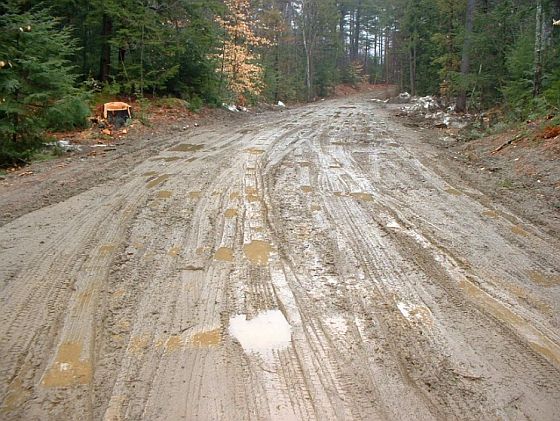Planning to Work on Your Camp Road or Driveway?
by Dale Finseth

Don't let your road start looking like this!
It is that time of the year when you may be planning to work on your driveway or your road association road. In rural Maine we frequently need to travel on and are often responsible for a gravel camp road or our own gravel driveway. Those road surfaces will collect and direct runoff into our lakes, ponds, streams and wetlands if not maintained properly. Unlike public roadways, you or your road association are directly responsible for their impact on water quality.
Gravel road erosion is a major source of sediment into our lakes and that sediment carries phosphorus and other toxins like road salt, oil, and the like. Gravel roads and their associated ditches can also concentrate the stormwater runoff from adjacent properties and direct it into our lakes or the associated streams. Improving the way those gravel roads function helps to protect water quality.
During the disruption caused by the COVID 19, some people's season homes were used much more over the past 18 months. That meant more traffic on those gravel roads. And this summer we anticipate that camps and seasonal homes will also get a great deal of use. An improved road costs less money over time and can minimize the impact on water quality.
We have begun to recommend that people consider both a spring gravel road maintenance and a fall maintenance schedule. Doing maintenance in the fall may make the spring effort easier and less expensive.
The Kennebec Soil and Water Conservation District and local watershed groups are focusing on gravel road management plans to provide landowners a better understanding of how their road impacts water quality and how to minimize that impact. A good road management plan provides landowners with information to better budget the resources they devote to their roadway. Those resources include the dues paid by landowners and the volunteer or contractor work to maintain it. A better maintained road can save a property from damage caused by stormwater leaving the roadway and damaging adjacent property. It is important to understand how the road "works".
The feedback about road plans written in the past few years is good. People appreciate the advantage of having a long-range plan to protect the investment already made in their roadway and make plans and budget for the future. The road management plan is usually for a shared road, i.e. it is the responsibility of all the property owners.
But, many of the recommendations and best management practices can be modified to help the individual camp owner better manage their own driveway. We do NOT want to see these gravel roads simply become a means to transport silt and phosphorus to our waterways. Intercepting that stormwater is an excellent way to help protect water quality.
And with the improved attention to long term maintenance people can expect better long-term water quality. Definitely a win-win! Remember, there is a lot to do in order to protect water quality.
Now retired, Dale Finseth was executive director of the Kennebec County Soil & Water Conservation District from 2001 to 2024.
<— Previous Article • Summaries • Next Article —>
©2021 by Summertime in the Belgrades. All rights reserved.

